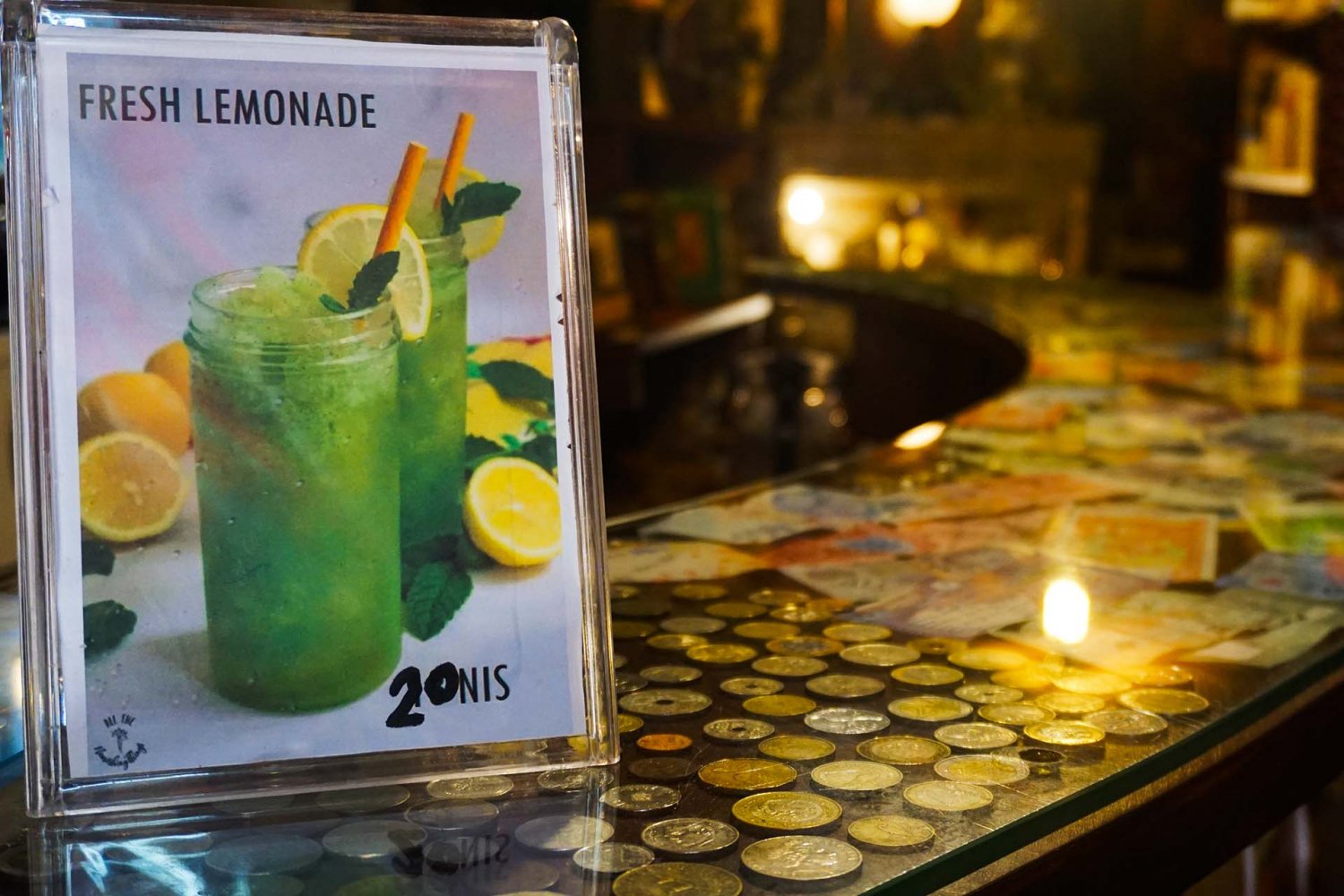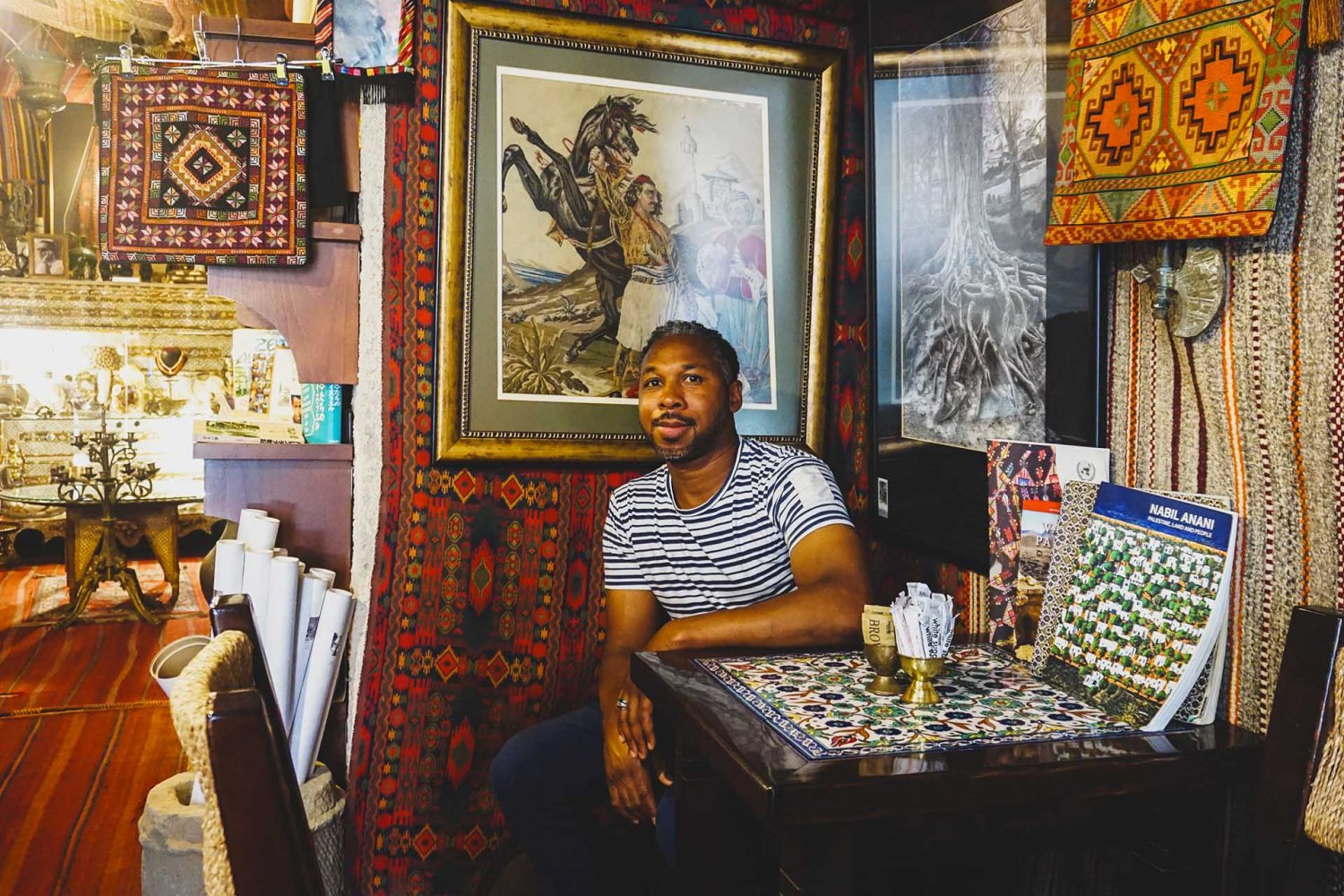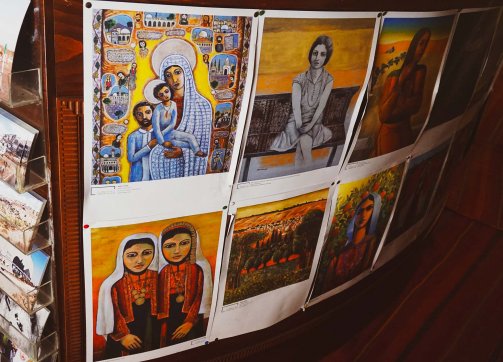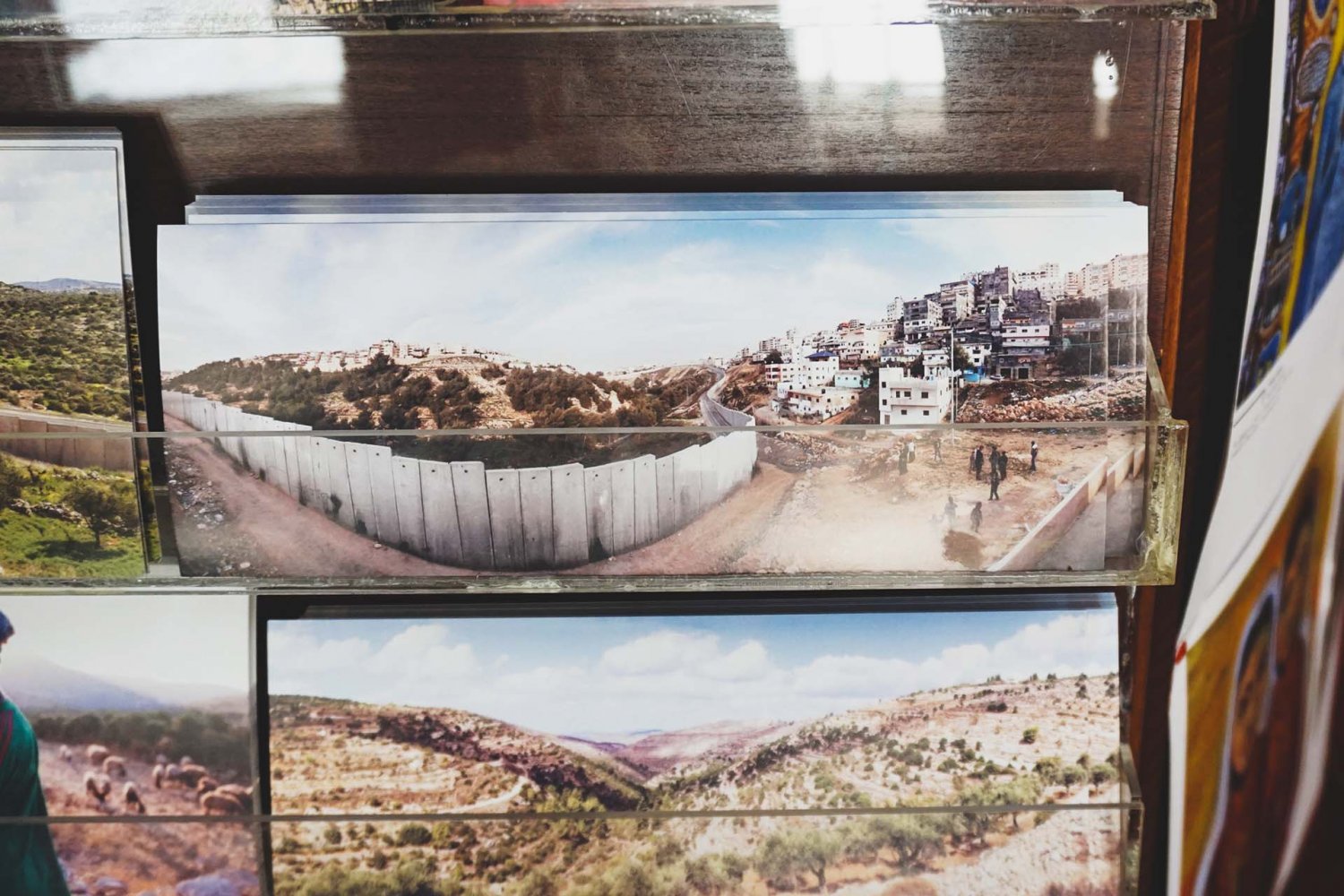Bassem’s Gallery & Café is tucked along Via Dolorosa Street in the Muslim Quarter of Jerusalem’s Old City. From the outside, it looks like an unassuming coffee shop; inside, it is a treasure-filled grotto. Every inch of wall is covered in eclectic rugs and every spare surface adorned with ornaments and trinkets, each with its own story to tell. The smell of Arabic coffee fills the air, and the gurgle of a water fountain in the cushioned seating area makes the place feel like a Middle Eastern oasis.
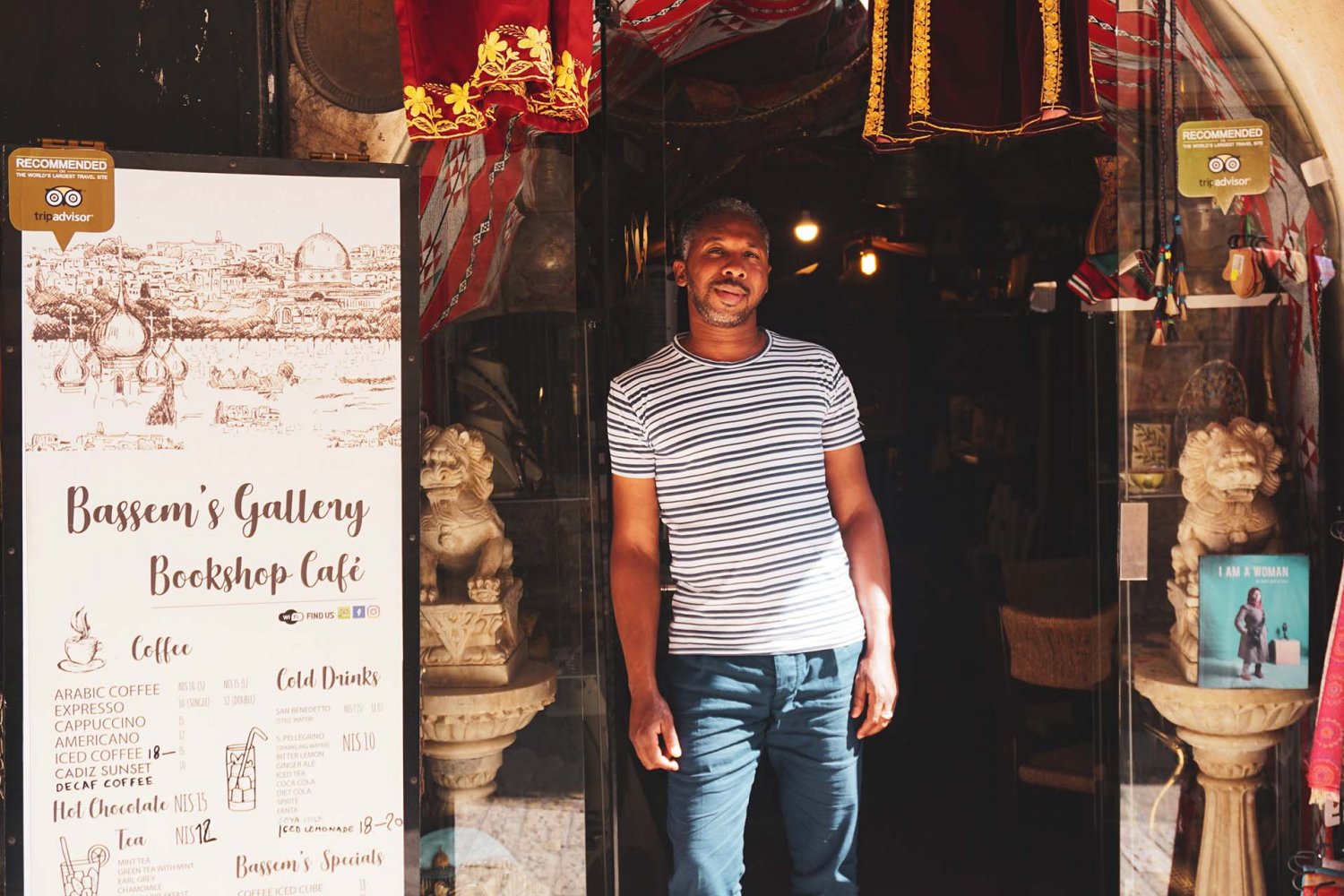
Credit:
Alice Austin for Jerusalem Story
A Visit to Bassem’s Gallery & Café: Celebrating and Preserving Palestinian Culture
Issam Bayan, the owner of Bassem’s Gallery & Café, is in the process of making some tourists a smoothie. He’s had a busy morning, he tells them. He had to go to the Representative Office of Switzerland in Ramallah to pick up a visa to travel to Zurich, and then rush back to Jerusalem to get a haircut. It’s been a stressful few weeks—he flies in two days and his visa only just came through this morning.
Issam, who is a Palestinian descended from African pilgrims, must apply for a visa every time he travels to a different country as he does not have a passport but rather must rely on a laissez-passer, which complicates his travel abroad. This is because Issam, like most Palestinian Jerusalemites, holds the legal status of permanent resident, not citizen, as this is the status the state has conferred upon him. Although Palestinian residents of Jerusalem can apply for Israeli citizenship, most do not and many who do have their applications denied. Israel imposes conditions on residents that make travel a risky matter. If they leave the country for too long, their legal status can be revoked, making them unable to return and live legally in their home city (see Precarious, Not Permanent: The Status Held by Palestinian Jerusalemites (Pt. 1)).
“This is what people in the West Bank don’t understand,” Issam says. “There’s a wall here too, it’s just not visible.”1 He is referring to the Separation Wall, a military complex of cement walls, guard towers, and patrol roads that slices through the West Bank, including parts of East Jerusalem. Issam’s family is one of 45 Palestinian families of African descent in Jerusalem—about 450 people and counting. He’s lived in Jerusalem all of his life, and this shop has been in the family for over 40 years.
“I started working here when I was 14 years old,” Issam says, sitting on a red velvet antique chair in the back of the coffee shop. “So I grew up working here, helping my uncle Bassem who started this store.” Bassem was an antique collector who specialized in Palestinian costume and jewelry. Over his life, he amassed an impressive collection of artifacts, which he bought, sold, and displayed until he passed away suddenly in 2014.
Issam decided to take on the responsibility of the shop to keep his uncle’s legacy alive. “He traveled all over the world, but the Old City was the most special place to him,” Issam says. “So for that reason I decided to keep the shop and keep his name in the Old City.”
For the first seven months, Issam wasn’t sure what to do with the place. It was like a museum, and people would come in to look around and not much else. After a while, Issam decided to turn it into a coffee shop, book shop, and gallery. “I wanted to meet people and tell them my story, let them read and educate themselves, and serve coffee and tea as an easy way to get a small income.”
Artisanal Treasures
Issam has preserved the original antiques from his uncle, and collected a few more himself. Traditional Palestinian dresses hang from the walls, each pattern representing a different Palestinian village and each style a different cultural reference. Issam points out a long blue dress that hangs from the wall, and explains how it’s worn by women who are either single or widows. “Some women used to come here to sell their dresses so they can have money to send their children to university,” Issam says.
The shop is also an opportunity for Issam to support and platform Palestinian craftsmanship. He works with embroiderers from Gaza, ceramicists from Nablus, and jewelers from Bethlehem to sell their wares. He even sells postcards by a photographer from Ramallah depicting the reality of life in Palestine. “I’m happy to share our culture and to show people that we love life,” Issam says.
Everything in this shop has a rich story and history, just like Issam himself. Issam’s grandmother is from Jericho and his grandfather is from Senegal. The original members of the Palestinian African community came to Jerusalem as pilgrims from Senegal, Sudan, Chad, and Nigeria. “My grandfather went to Mecca to make hajj [pilgrimage], and in Islam we believe that after hajj you must come and pray at al-Aqsa Mosque.” That’s when he met Issam’s grandmother.
Issam says the Palestinian African community does not experience racism from Palestinians in the same way as Black communities in the US or UK, a reality that he ascribes to Islam’s teachings about equality. “We face daily difficulties,” Issam says. "Everyone is suffering, but especially people in the Old City, near al-Aqsa Mosque, and in Silwan where there’s settlers and trouble all the time.”
“You grow up fast in Jerusalem,” Issam continues. “I felt a lot of responsibility at a young age. My friends got stabbed or went to jail. This was normal for us at 15 or 16. At that age we should be playing, but this is the reality.”
In many ways, Issam’s gallery is a preservation of Palestinian culture, as well as a celebration. There’s a cabinet made of ivory at the back of the shop that is like a window into Bassem’s travels. Inside there’s a horse made of ivory, an antique Bedouin dagger, a silver belt from Yemen, and traditional Palestinian jewelry. Even the cabinet itself is an artifact. “It’s a very rare piece made from ivory in Damascus; it’s about 98 years old,” explains Issam.
Personal Touch
For Issam, sharing his identity and story with so many people is a balancing act. He’s learned how to read people quickly, and to discern the ones who are receptive to learning more from those who have made up their minds. Jerusalem is an emotional flashpoint for millions of people from all around the world, and many have preconceived ideas of the city’s history. Issam says he is protective of his experiences and identity while sharing and educating others. This is complex terrain that Palestinian shopkeepers in the Old City are forced to navigate.
Issam runs his shop alone, which makes it hard to take time off. He’d like to employ someone to help him run the place, but for now he’s managing on his own. He has no interest in social media, and prefers that people come to his shop through recommendations or articles. He has nothing but rave reviews on Trip Advisor, and is recommended as one of the top coffee shops in the Old City. But Issam’s priority is to keep the place special and intimate. “I don’t want it to turn into Starbucks,” he says.
There’s no chance of that happening. With this café, Issam has created a space so rich in Palestinian history and culture you can feel it in the air. It’s a place of pride and joy, not just for Issam and his family, but for the entire Palestinian community.
Notes
This and all subsequent quotations from Issam Bayan are from an interview with the author, May 23, 2023.

